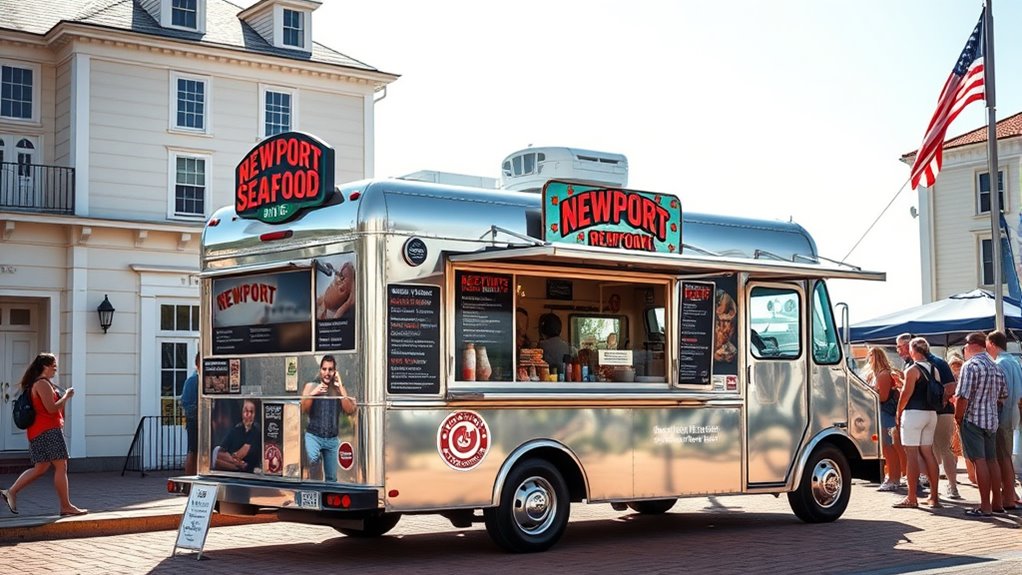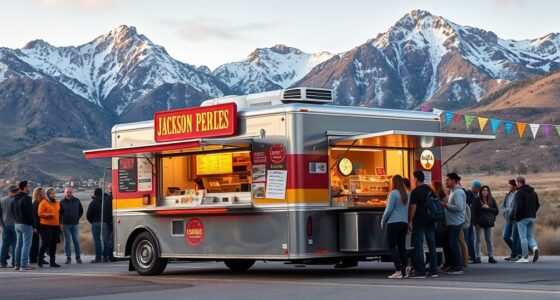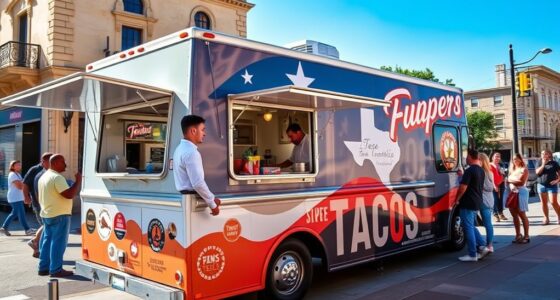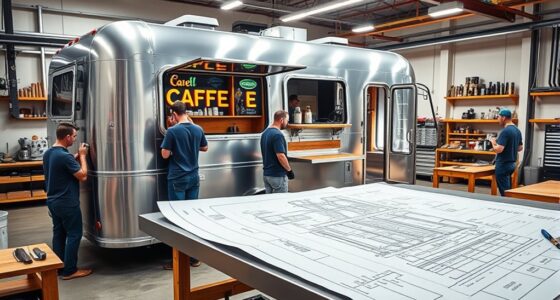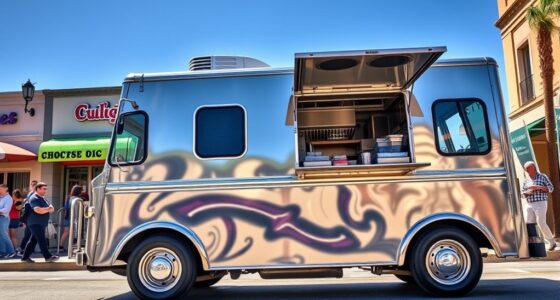To open a food truck in Newport, Rhode Island, you’ll need to secure permits like a Mobile Food Service License (~$100/year), register your vehicle, and obtain local approvals for your chosen locations. Startup costs vary from around $15,000 for a used truck to over $100,000 for a new one, plus ongoing expenses. Focus on high-foot-traffic spots, develop a compliant menu, and use digital marketing to attract customers. Continuing further will reveal essential tips to make your venture successful.
Key Takeaways
- Obtain necessary permits including Mobile Food Service License (~$100/year), Retail Sales Permit (~$10), and local event permits for compliance.
- Budget $15,000–$200,000 for truck purchase, equipment, safety features, and licensing; plan ongoing costs like fuel and staffing.
- Choose high-foot-traffic locations in Newport, secure parking permits, and participate in community events for visibility.
- Develop a safe, compliant menu suitable for mobile kitchens, focusing on proper temperatures, hygiene, and allergen info.
- Promote your food truck through social media, branding, local partnerships, and loyalty programs to attract and retain customers.
Navigating Licensing and Permit Requirements in Newport
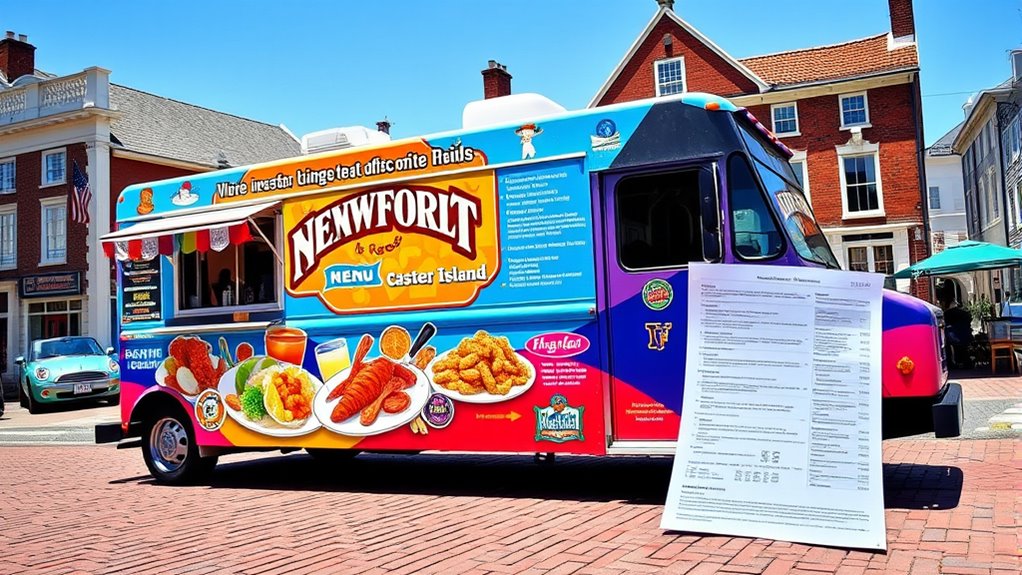
Understanding licensing and permit requirements in Newport can seem complex, but understanding the key steps makes the process manageable. First, you need to register your mobile food establishment (MFE) with the Rhode Island Commerce Corporation, which costs around $50. Next, obtain a Mobile Food Service License from the Rhode Island Department of Health, approximately $100 annually, and schedule health inspections. If your truck uses fuel-based generators or cooking equipment, you’ll need a fire safety inspection, costing between $50 and $100, arranged by the State Fire Marshal. You must also have valid motor vehicle registration and insurance. Additionally, secure a Retail Sales Permit for collecting sales tax, which costs about $10. Finally, check local regulations, as some municipalities require separate permits or approvals for mobile food operations. Registering your MFE is essential because it ensures your business is compliant at the state level before operating in Newport. Understanding local regulations is also crucial, as they may impose additional requirements specific to Newport or specific neighborhoods.
Estimating Startup Expenses and Operational Costs
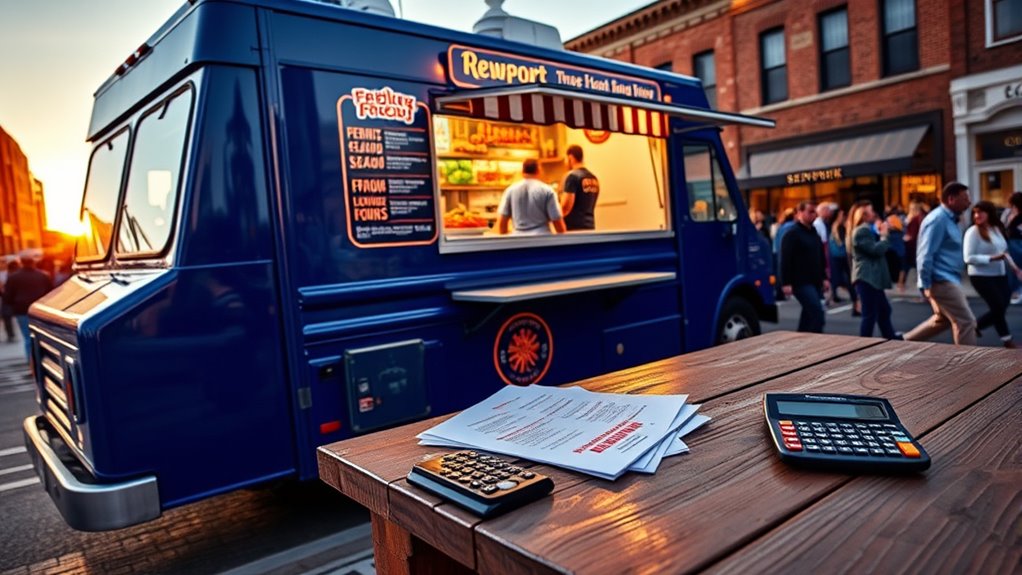
Estimating startup and operational costs is a vital step in planning your food truck business. Your initial investment varies widely depending on truck type and build-out. A new truck can cost between $100,000 and $200,000, while used models range from $35,000 to $100,000. Coffee trucks or trailers may cost $15,000 to $100,000. Customization and equipment add to costs, with cooking gear like grills and ovens costing hundreds to thousands. Safety features, including fire suppression, cost $2,000 to $5,000. You’ll also need refrigeration, POS systems, and sanitation setups, which can total several thousand dollars. Licensing, permits, insurance, and initial inventory expenses further shape your budget. Factoring in UV protection and other sun safety measures can also be an important part of maintaining staff health and productivity. Ongoing costs like fuel, maintenance, labor, and marketing should be carefully projected to guarantee your food truck remains profitable. Operational expenses can significantly impact your budget and should be carefully projected to ensure long-term success.
Choosing Prime Locations and Complying With Regulations

Selecting the right locations and ensuring compliance with regulations are crucial steps to running a successful food truck in Newport. You need to focus on high foot-traffic areas like downtown, tourist spots, and busy commercial districts. To do this effectively, consider:
- Finding spots with ample space for parking and setup, fitting within local parking rules.
- Staying clear of restrictions that require maintaining distance from brick-and-mortar restaurants.
- Verifying permitted operating hours and noise limits to avoid violations.
- Regularly reviewing local ordinances and food truck regulations to stay updated on any changes that could affect your operations.
Additionally, you must secure municipal permits, such as the $75 vending fee, and register with local authorities. Equip your truck with safety features like propane alarms, fire suppression, and proper refrigeration. Consistently check zoning rules and coordinate with Newport officials to stay compliant and maximize your visibility. Enacting 2018, Rhode Island’s mobile food truck regulations require operators to register with the Department of Business Regulation and obtain a Mobile Food Service license from the Department of Health.
Designing a Food Menu That Meets Health Standards

When designing your menu, you need to prioritize food safety measures by selecting items that can be handled, cooked, and stored at proper temperatures. Use safe handling techniques, such as avoiding cross-contamination and maintaining hygiene protocols, to protect your customers. Ensuring your menu supports effective temperature controls helps prevent foodborne illnesses and keeps your operation compliant. Proper food storage is essential to maintain food quality and safety throughout your service. Incorporating food safety standards into your menu planning further ensures compliance and customer trust.
Prioritize Food Safety Measures
Designing a food menu for a Newport Rhode Island food truck requires careful attention to health standards to guarantee public safety. First, guarantee each menu item includes a temperature control plan, detailing proper cooking and holding temperatures. Second, select ingredients that minimize cross-contamination and allergen risks, especially in a mobile environment. Third, document recipes and preparation methods as part of your standard operating procedures, so health inspections are smooth. Additionally, get menu approval from RIDOH, focusing on food types and preparation techniques that reduce health risks. Prioritizing safe sourcing from approved suppliers and choosing less perishable ingredients helps maintain quality and safety. Implementing proper food handling procedures is essential to prevent contamination. Recognizing the importance of food safety standards and maintaining compliance ensures your menu meets Rhode Island’s strict health standards and keeps your customers safe.
Use Safe Food Handling Techniques
To guarantee your food truck operates safely and meets health standards, you must implement proper food handling techniques throughout your menu. Design your menu to focus on items that can be prepared and served within your mobile kitchen’s constraints, avoiding high-risk foods like raw or undercooked meats. Clearly outline preparation methods in your standard operating procedures to ensure consistency. Choose ingredients with low perishability that can be stored safely and label menu items with allergen and sourcing information per health codes. Always procure ingredients from Rhode Island Department of Health-approved vendors and maintain documentation of sources. Proper food safety protocols are essential for minimizing health risks and ensuring compliance. Train your staff in safe preparation practices, emphasizing hygiene, cross-contamination prevention, and proper handling techniques to minimize health risks and ensure compliance. Additionally, adhering to local health department regulations is essential for maintaining your license and ensuring customer safety.
Maintain Proper Temperature Controls
Creating a food menu that complies with health standards begins with understanding the importance of proper temperature controls. To do this, focus on menu items that can be cooked, stored, and served within safe temperature ranges. Visualize your kitchen:
- Foods cooked to at least 165°F, then hot-held above 135°F during service.
- Cold foods like cut melons stored at or below 41°F, with thermometers monitoring temps.
- Packaged foods that don’t need additional temperature control, simplifying compliance.
Avoid dishes that require prolonged storage or complex temperature management, such as raw sprouts or garlic/oil mixtures. By designing your menu around the truck’s cold and hot holding capabilities, you reduce food safety risks and make inspections smoother. Proper temperature controls are essential for safe, high-quality food service.
Effective Marketing Strategies to Attract Customers

Effective marketing is essential for your food truck to stand out in Newport’s competitive scene. You need a clear brand and value proposition that highlights what makes you unique, like local ingredients or a special cuisine. Use storytelling to connect emotionally with customers and incorporate your USP into all messaging. Leverage digital platforms such as Instagram, Facebook, and Twitter to promote daily specials and locations. Geo-targeted ads and a well-maintained website boost online visibility. Participating in local events and collaborating with community partners or influencers helps increase exposure. Consider this table for quick ideas:
| Strategy | Action | Goal |
|---|---|---|
| Unique Branding | Develop logo, USP, and story | Build recognition |
| Digital Engagement | Post regularly, run ads, incentivize | Grow following |
| Community Involvement | Attend events, partner locally | Increase local loyalty |
| Customer Loyalty | Rewards, personalized updates | Encourage repeat visits |
Additionally, understanding the importance of exfoliation can help you target specific skin concerns when promoting glycolic acid products or treatments to your customers.
Ensuring Food Safety and Maintaining Quality Standards
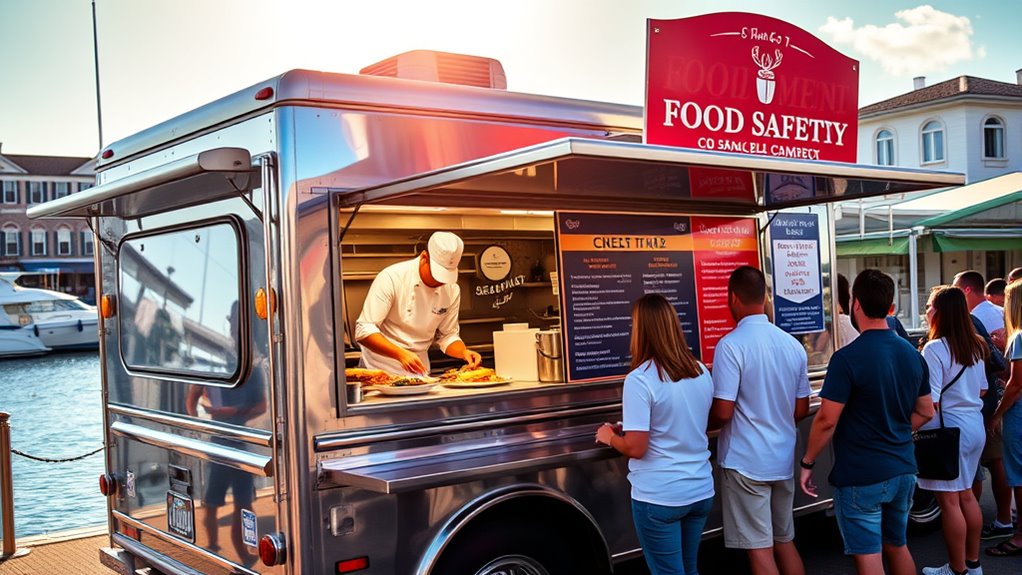
Maintaining food safety and quality standards is essential for your food truck’s reputation and customer trust in Newport. To do this, you’ll need to follow strict regulations. First, register under the Mobile Food Establishment Act and get a Mobile Food Service License from the Department of Health. Second, employ a ServSafe-certified manager to oversee safety during operating hours. Third, ensure your refrigeration keeps foods below 41°F, with proper equipment like a three-compartment sink and handwashing station. Keep your truck clean, sanitized, and well-lit to prevent contamination. Regularly test propane alarms and gas connections for safety. Maintain temperature logs, separate raw and cooked foods, and train staff in hygiene practices. Additionally, implementing robust risk management practices helps prevent potential issues that could compromise food safety. These steps keep your food safe, fresh, and appealing to customers in Newport.
Frequently Asked Questions
Can I Operate a Food Truck on Private Property in Newport?
You can operate a food truck on private property in Newport, but you’ll need permission from the property owner and must comply with local regulations. Make certain you obtain all necessary permits, like the Rhode Island Mobile Food Establishment registration, a health license, and possibly a Newport municipal permit. Check zoning rules, maintain proper sanitation, and display permits visibly. Working closely with local authorities and the property owner helps keep everything legal and smooth.
Are There Specific Noise Restrictions for Food Trucks in Newport?
Ever wondered how loud your food truck can be in Newport? You need to keep noise levels below 86 dB(A) within 50 feet to avoid fines. This includes engine noise, music, or any sound from your truck. Are you prepared to monitor noise and stay compliant? Remember, Newport enforces these rules through inspections and noise cameras. Stay within limits, and you’ll keep operating smoothly without penalties.
How Do I Renew My Permits Annually in Newport?
To renew your permits annually in Newport, you start by submitting updated applications through the Rhode Island Commerce Corporation or e-permitting portal. Make sure to include current health licenses, fire inspection certificates, vehicle registration, insurance, and a retail sales permit. Pay the necessary fees, typically around $50 to $100, and keep logs of fire and propane tests. Begin the process early to prevent delays and guarantee continuous operation.
Is Outdoor Seating Allowed for Food Trucks in Newport?
You might think outdoor seating is automatically allowed, but in Newport, it’s heavily restricted. The city favors controlled, modest outdoor areas, and large sidewalk setups are usually denied for safety reasons. You need to get separate permits, make sure your tables don’t block pedestrian pathways, and follow strict guidelines from city, RIDOT, and health departments. So, outdoor seating isn’t freely permitted; it requires careful planning, approval, and compliance.
What Are Newport’s Rules for Selling Alcohol From a Food Truck?
In Newport, you can’t sell alcohol directly from your food truck. State regulations prohibit mobile food establishments from offering alcoholic beverages, and local laws follow this rule strictly. You must operate from a fixed location with a proper license to sell alcohol. So, if you want to serve drinks, you’ll need to set up at a stationary site and obtain the appropriate permits, as mobile alcohol sales are not allowed.
Conclusion
Starting your food truck in Newport isn’t just about permits or menus—it’s about planting seeds for a vibrant community journey. As you navigate regulations, costs, and locations, remember each step is like tending to a garden: patience, care, and passion will help your venture bloom. With dedication and creativity, your truck can become more than a business—it can symbolize a beacon of flavor and connection, transforming a simple idea into a lasting legacy in Newport’s lively landscape.
